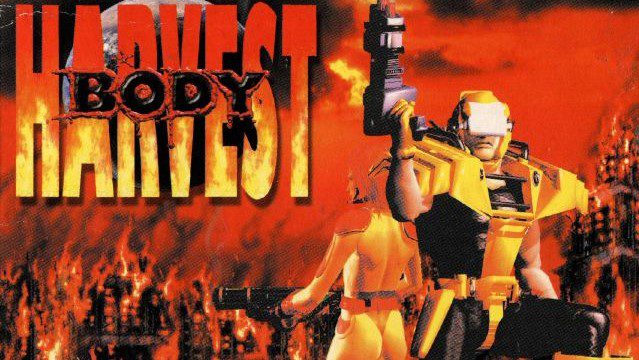The horror… The horror…
Open-world games are an overwhelming presence in today’s industry, but once upon a time, they were a bit of a dream. Huge environments just weren’t easy to create in the memory-limited age of early-3D. Attempts were made, of course, some more successful than others.
Body Harvest is one of the more unusual ones. Released by DMA Design after Grand Theft Auto and at essentially the exact same time as Space Station Silicon Valley in October 1998, it would largely be lost against the company’s progression towards the explosive Grand Theft Auto III. Its tumultuous development cycle certainly didn’t do us any favors, but it arrived nonetheless and the world is better for it.

The narrative of Body Harvest is a pretty good watermark for how expectations for video game stories has changed. It’s the unimaginably distant year of 2016, and the last remaining humans are on a space station. Aliens have been showing up every 25 years for the past 100 years and harvesting humans within a sectioned-off area. The seems really inefficient, but apparently, it eliminated the race, so…
It’s sort of fridge logic. On the surface, it seems kind of cool: the arrival of a comet brings doom. Then you start asking questions like, “so nobody tried to resettle the harvested areas?” “They actually harvested faster than the human birthrate?” “Humans never tried to mount a defense?” There are plenty of NPCs to talk to, but none of them are like, “Oh, shit! I heard this same thing happened in Greece 25 years ago!”
It’s dumb, but also kind of cool. There’s this sort of mystery element to it that the game never abandons for intensity.

Indeed, you almost have to investigate each area. You land in Greece, Java, America, and Siberia on your quest, and each is a big area divided into smaller sections. Each section has a core problem blocking your progression.
The flow of Body Harvest largely involves making it from town to town, saving them from invaders with as little collateral damage as you can manage, then figuring out how to proceed to the next area. When all areas are complete, you go up against the shield generator to free the area. It’s an interesting mix of combat and puzzle-solving. Each of the areas has a smattering of vehicles to help you get around and kill bugs, ranging from simple automobiles to tanks and helicopters.
I mentioned the game as being open-world, but that doesn’t mean it’s non-linear. There’s a pretty clear path that you have to take from location to location, and backtracking isn’t always an immediate option. Once an area is clear, typically you can find some sort of flying vehicle to get you back to anything you missed, but most of the time you’re being pushed onwards.

The soundtrack deserves special mention because it’s incredibly unconventional. It’s very piano-heavy and moody in a way that reminds me of Resident Evil 2 of all games. You wouldn’t really expect it from a game about alien invasion, but it drenches everything in this thick, doughy atmosphere. It creates an uneasy feeling that is otherwise not given by the gameplay.
This isn’t to say Body Harvest doesn’t have brains or depth. Some of the writing is quite decent, even for throwaway characters and puzzle introductions. It’s similar to the plot; something about is completely daft, but it comes across with such style that you don’t really notice until you put it down.
The levels, taking place in various time periods and locations are all very distinct. Greece is in 1916, during the height of World War I, while Java is 1941 during the Japanese occupation. This gives you access to various wartime vehicles like biplanes and Zeroes. It then progresses to 1960’s America, which has its own unique feel to it, then Siberia with more modern military vehicles. It’s a lot, and there’s always something new, which is one reason to stay glued.

Originally, Nintendo was slated to publish Body Harvest. It was actually slated as a launch title, but DMA Design and Nintendo had a bit of trouble working together. Nintendo didn’t dig the game’s violent themes, and a lot of back and forth went on between them and DMA. Eventually, Nintendo dropped the whole project, which had become some amalgam of DMA and Nintendo’s concepts.
There are some issues. The framerate is horrible, to start with. Honestly, that’s something I’ve grown used to having spent so much time on the N64. That, and the horrible fog.
The game doesn’t play that badly, but it is rather clunky. Movement in general just kind of feels like slow motion and the vehicle physics are somewhat wobbly. It’s nothing that kills the game, it just takes some getting used to.
It can also suck having your vehicle destroyed in the middle of nowhere. As I said, the walking is horribly slow, so if you take a turn too hard and put your jalopy in the water, then get ready to admire the running animation. Some of the areas are small enough that it’s not that much of a pain, but when it happens on a volcano, it can be rather aggravating.

From the sounds of it, getting the game completed was a frustrating experience. Its design mutated and evolved a lot. What we got was the result of a massive series of compromises and gymnastics. The fact that it’s not just a good game, but one that stands out as a unique and compelling experience, is frankly amazing. Rarely does corporate meddling and a whirling lack of focus result in such a project.
Yet, here it is. Body Harvest was something that captured my imagination as a child, and when I played it again as a humorless adult, I still found it impressive. It may be a bit antiquated by today’s standards, but all those little facets that it absolutely nails create an experience that isn’t easily forgotten. It’s just too bad that it has never been re-released, and I doubt there’s any convincing Rockstar that it’s money worth chasing.
For other retro titles you may have missed, click right here!






Published: Oct 2, 2021 08:00 am